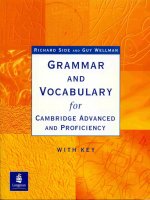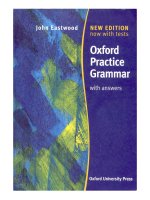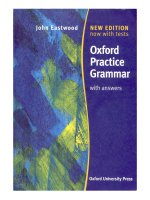Free Grammar E-Book Level 1 ppt
Bạn đang xem bản rút gọn của tài liệu. Xem và tải ngay bản đầy đủ của tài liệu tại đây (884.51 KB, 44 trang )
~ 1 ~
www.espressoenglish.net
Free Grammar
E-Book
Level 1
~ 2 ~
www.espressoenglish.net
Table of Contents
Present Simple: To Be…………………………………………………………………… 4
Possessives…………………………………………………………………………………… 6
Articles: A, An, The ……………………………………………………………………… 7
This, That, These, Those……………………………………………………………… 8
Present Simple……………………………………………………………………………… 10
Can / Can't / Have to / Don't Have to………………………………………… 14
Prepositions: In, At, On………………………………………………………………… 15
Past Simple: To Be………………………………………………………………………… 17
Past Simple: Regular Verbs…………………………………………………………… 18
Past Simple: Irregular Verbs………………………………………………………… 20
There is / There are……………………………………………………………………… 22
Present Continuous………………………………………………………………………… 23
Present Simple or Continuous……………………………………………………… 26
Countable and Uncountable………………………………………………………… 27
Future with Going To…………………………………………………………………… 29
Comparative Adjectives………………………………………………………………… 31
Superlative Adjectives…………………………………………………………………… 34
Adverbs…………………………………………………………………………………………… 36
Present Perfect: Verb be…………………………………………………………………38
Present Perfect: Other Verbs………………………………………………………… 40
Present Perfect or Past Simple……………………………………………………… 42
~ 3 ~
www.espressoenglish.net
Welcome!
Espresso English has fun, fast online English
lessons every week! The lessons include reading,
listening, vocabulary, grammar, and practice exercises. If
you have a question, you can contact the teacher.
This book teaches beginner-level grammar topics with
links to grammar exercises on the website. Espresso
English will publish intermediate and advanced level
grammar books in the future – so sign up for the e-mails
to get news about books, courses, and other products.
This Grammar e-Book is free – so please share it with
your friends. I hope you enjoy it!
- Shayna Oliveira
EspressoEnglish.net
~ 4 ~
www.espressoenglish.net
Present Simple: Be
Positive:
I am
I’m
from Japan.
you / we / they are
you’re / we’re / they’re
from Brazil.
he / she / it is
he’s / she’s / it’s
from India.
Negative:
I am not
I’m not
married.
you / we / they
are not
You’re not / You aren’t
We’re not / We aren’t
They’re not / They aren’t
happy.
he / she / it
is not
He isn’t / He’s not
She isn’t / She’s not
It isn’t / It’s not
a student.
Question:
Am
I
beautiful?
Are
you / we / they
a teacher?
Is
he / she / it
tall?
~ 5 ~
www.espressoenglish.net
Present Simple: Be
Name:
I’m Joanna.
He’s Paulo.
They’re Aki and Yuta.
Country:
I’m from the U.S. I’m American.
My husband is from Italy. He’s Italian.
She’s not Korean, she’s Vietnamese.
Are they from Australia?
Age:
I’m 27 years old.
How old are you?
She’s 15.
My mother is 65 years old.
Emotions:
I’m sad.
She’s excited.
You’re angry.
We’re happy.
Jobs:
I’m not a student. I’m a teacher.
Are you a doctor?
He’s a journalist.
They’re artists.
Grammar Exercise: Present Simple: Be
~ 6 ~
www.espressoenglish.net
Possessives
NOUN
POSSESSIVE
EXAMPLE
I
my
My name is Sandra.
you
your
What’s your name?
he
his
His name is John.
she
her
Her computer is fast.
it
its
My car is old, so its engine isn’t powerful.
we
our
Our apartment is in the city center.
they
their
My parents sold their house.
Mary
Mary’s
Mary’s phone number is 555-4321.
Joe
Joe’s
Joe’s favorite color is green.
the boy
the boy’s
The boy’s clothes are dirty.
friends
friends’
My friends’ names are Patrick and Gloria.
cat
cat’s
My cat’s name is Ginger.
country
country’s
My country’s flag is red, white, and blue.
Don’t confuse its (possessive) with it’s (contraction for “it is”)!
The cat ate it’s food
The cat ate its food.
Its illegal for a 17-year-old to buy alcohol.
It’s illegal for a 17-year-old to buy alcohol.
Grammar Exercise: Possessives
~ 7 ~
www.espressoenglish.net
Articles: A, An, The
I’m going to eat an apple. I’m going to eat the red apple.
a / an
general
(one of
many)
I want to buy a car.
He’s eating an apple.
Do you have a bike?
She is an old woman.
I’m reading a book.
the
specific
(one
specific)
Tokyo is the capital of Japan.
The new Chinese restaurant is very good.
We like the blue car.
The girl in the red dress is beautiful.
I’m reading the new book by J.K. Rowling.
~ 8 ~
www.espressoenglish.net
Articles: A, An, The
Use “an” if the word starts with the sound of a, e, i, o, u:
an apple
an egg
an ice cream shop
an open door
an umbrella
an hour
Use “a” if the word starts the sound of any other letter.
Do not use “the” with countries or cities:
I live in the China.
I live in China.
Do not use “the” with things in general:
She likes the pizza.
She likes pizza.
She like the pizza from Tony’s Restaurant. (specific)
Grammar Exercise: A, An, The
~ 9 ~
www.espressoenglish.net
This, That, These, Those
This
1 thing – near
That
1 thing – far
These
2+ things – near
Those
2+ things – far
This apple is green. That apple is red.
These books are new. Those books are old.
~ 10 ~
www.espressoenglish.net
Present Simple: Positive
Use the present simple for things that happen regularly or things
that are generally true.
I / you / we / they
work
he / she / it
works
Examples:
I work in a bank.
He works at the university.
We work every day.
My sister works at the hospital.
Special Case 1
For verbs that end in consonant + –y, we remove the –y and
add –ies:
I study English at school.
Dana studies English at school.
Bill studys English at school
Other verbs like this: cry, try, fly, carry
Special Case 2
For verbs that end in -o, -sh, -s, -ss, -ch, -x, we add -es.
They go to English class on Wednesday.
She goes to cooking class on Saturday.
She gos to cooking class on Saturday.
Other verbs like this: watch, kiss, teach, fix
~ 11 ~
www.espressoenglish.net
Present Simple: Negative
Use the present simple for things that happen regularly or things
that are generally true.
I / you / we / they
don’t
like
he / she / it
doesn't
like
Examples:
I don't like coffee.
John doesn't like pizza.
John and David don't like milk.
My mother doesn't like to travel.
Common Errors
1) In the present simple negative, do not add -s:
Martha doesn't likes to dance.
Martha doesn't like to dance.
2) Other common errors:
Pete no like bananas.
Pete not like bananas.
Pete doesn’t like bananas.
~ 12 ~
www.espressoenglish.net
Present Simple: Questions
Use the present simple for things that happen regularly or things
that are generally true.
Do
I / you / we / they
live in a city?
Does
he / she / it
live in a city?
Examples:
Do you live in Brazil?
Does Adam live in England?
Do they live in a big house?
Does she live near the beach?
Common Errors
1) In questions, don't use -s:
Does she lives close to the beach?
Does she live close to the beach?
2) Don’t forget DO or DOES:
Clara live in a big city?
Does Clara live in a big city?
~ 13 ~
www.espressoenglish.net
Present Simple: Answering
Yes/No Questions
Do you have a dog?
Yes, I do. / No, I don't
Do I look fat in these jeans?
No, you don’t!
Does John speak Italian?
Yes, he does. / No, he doesn't.
Does she like rock music?
Yes, she does. / No, she doesn’t.
Do we watch too much TV?
Yes, we do. / No, we don’t.
Do they understand English?
Yes, they do. / No, they don't.
Grammar Exercises:
Present Simple Positive
Present Simple Negative
Present Simple Questions
~ 14 ~
www.espressoenglish.net
Can / Can’t
Have to / Don’t have to
Can
It’s OK
Can’t
It’s not OK
Have to
It’s necessary
Don’t have to
It’s not necessary
You can ride your bike here. You can’t smoke here.
You have to stop here. You don’t have to pay
for the food.
FREE
FOOD!
~ 15 ~
www.espressoenglish.net
Prepositions: In, At, On
TIME
PLACE
IN
Months
In January
In October
Seasons
In the summer
In the spring
Years
In 2004
In 1986
Periods of the day
In the morning
In the evening
(exception: at night)
Cities and countries
In Tokyo
In Japan
Rooms and buildings
In the kitchen
In the supermarket
Closed spaces
In the car
In a park
~ 16 ~
www.espressoenglish.net
Grammar Exercise: Prepositions: In, On, At
TIME
PLACE
ON
Dates and days
On Monday
On February 14
th
Transportation
On the bus
On a bike
(exception: in a car)
A surface
On the table
On the wall
TIME
PLACE
AT
Times
At 6:00
At half past three
At noon
Contexts
At school
At work
At a party
~ 17 ~
www.espressoenglish.net
Past Simple: To Be
Positive:
I / he / she / it
was
born in 1982.
you / we / they
were
born in 1982.
Negative:
I / he / she / it
was not (wasn’t)
born in Europe.
you / we / they
were not (weren’t)
born in Europe.
Question:
Was
I / he / she / it
a famous artist?
Were
you / we / they
a famous artist?
Grammar Exercise: Past Simple: To Be
Common words used to talk about the past:
Yesterday
Last Sunday / last week / last month /
last November / last year
1 hour ago / 5 days ago / 3 months ago / 10 years ago
When I was a child
~ 18 ~
www.espressoenglish.net
Past Simple: Regular Verbs
Positive:
I / you / he / she / it / we / they
worked
yesterday
Negative:
I / you / he / she / it / we / they
didn’t work
yesterday
Question:
Did
I / you / he / she / it /
we / they
work
yesterday?
How to form the past simple for regular verbs:
Verb
Past
Spelling
listen
play
listened
played
Add -ed
like
decide
liked
decided
Add -d
stop
stopped
One vowel + one
consonant = double the
consonant and add -ed
study
try
studied
tried
One consonant + y
-ied
~ 19 ~
www.espressoenglish.net
Past Simple: Regular Verbs
Examples:
I talked with my mother last night.
We enjoyed the party on Saturday.
She finished the test early.
He didn’t listen to the teacher’s instructions.
They didn’t want to join us for coffee.
Jill didn’t stay in a hotel last summer.
Did you watch the news yesterday?
Did they remember to turn off the lights?
What time did your father arrive?
Grammar Exercise: Past Simple Regular Verbs
In past simple negative and questions, do not add -ed:
Mary didn’t liked the movie.
Mary didn’t like the movie.
Did you studied for the test?
Did you study for the test?
~ 20 ~
www.espressoenglish.net
Past Simple: Irregular Verbs
Infinitive
Positive
Negative
be
was / were
wasn’t / weren’t
buy
bought
didn’t buy
can
could
couldn’t
eat
ate
didn’t eat
get
got
didn’t get
go
went
didn’t go
have
had
didn’t have
leave
left
didn’t leave
make
made
didn’t make
meet
met
didn’t meet
say
said
didn’t say
see
saw
didn’t see
take
took
didn’t take
think
thought
didn’t think
understand
understood
didn’t understand
wear
wore
didn’t wear
write
wrote
didn’t write
~ 21 ~
www.espressoenglish.net
Past Simple: Irregular Verbs
Examples:
Where were you last month?
I was in France.
What did your sister buy at the mall?
She bought new shoes.
What time did he eat breakfast today?
He ate breakfast at 6:00 AM.
When did you get married?
We got married in July.
Why did she go to London?
She went to London to study English.
Did you have any pets when she was a child?
Yes, I had a dog.
When did he leave the meeting?
He left the meeting an hour before it finished
What did you make for dinner?
I made some vegetable soup.
When did you meet your best friend?
I met my best friend 20 years ago.
What did the teacher say?
The teacher said that she loved our class.
Did you see Brad at the football game?
No, but we saw Peter and Henry.
What did he wear to the wedding?
He wore a suit.
Did he write a new book last year?
No, he only wrote a few magazine articles.
Grammar Exercise: Past Simple – Irregular Verbs
~ 22 ~
www.espressoenglish.net
There is / There are
Singular
Plural
(+)
There’s a pillow on the sofa.
There are two pillows on the bed.
(-)
There isn’t a mirror in the
bathroom.
There aren’t any windows in the
bedroom.
(?)
Is there a table?
Yes, there is. / No, there isn’t.
Are there any chairs?
Yes, there are. / No, there aren’t.
There’s a pillow on the sofa. There are two pillows on the bed.
Is there a table? Yes, there is. Are there any chairs?
No, there aren’t.
~ 23 ~
www.espressoenglish.net
Present Continuous: Positive
Present continuous is for things happening now, at the moment.
I
am
watching
you / we / they
are
watching
he / she / it
is
watching
Examples:
I am watching TV right now.
He is studying at the moment.
It is raining today.
We are thinking about you.
They are playing baseball.
Some verbs are never used in the present continuous:
like, want, need, believe.
I’m believing in God.
I believe in God.
She’s wanting a soda.
She wants a soda.
You can use contractions:
I'm watching TV right now.
He's studying at the moment.
It's raining today.
We're thinking about you.
They're playing baseball.
~ 24 ~
www.espressoenglish.net
Present Continuous: Negative
I
am not
(I’m not)
listening
you / we / they
are not
(aren’t)
listening
he / she / it
is not
(isn’t)
listening
Examples:
I am not working at the moment.
She is not wearing a hat today.
You are not listening to the teacher.
Pete and Jan are not watching TV.
There are two ways to use contractions:
She’s not wearing a hat today.
She isn’t wearing a hat today.
You’re not listening to the teacher.
You aren’t listening to the teacher.
Both forms are OK!
~ 25 ~
www.espressoenglish.net
Present Continuous: Questions
Am
I
working?
Are
you / we / they
working?
Is
he / she / it
working?
Examples:
Are you writing a letter?
Is Pedro sleeping right now?
Are the children playing a game or reading a book?
Is the computer working?
Grammar Exercises:
Present Continuous Positive
Present Continuous Negative
Present Continuous Questions
You can put a question word at the beginning:
What are you doing?
I’m writing an e-mail.
Where is Sarah going?
She’s going to the store.
Who are they talking to?
They’re talking to the teacher.
Why is he running?
Because he’s late for work.









